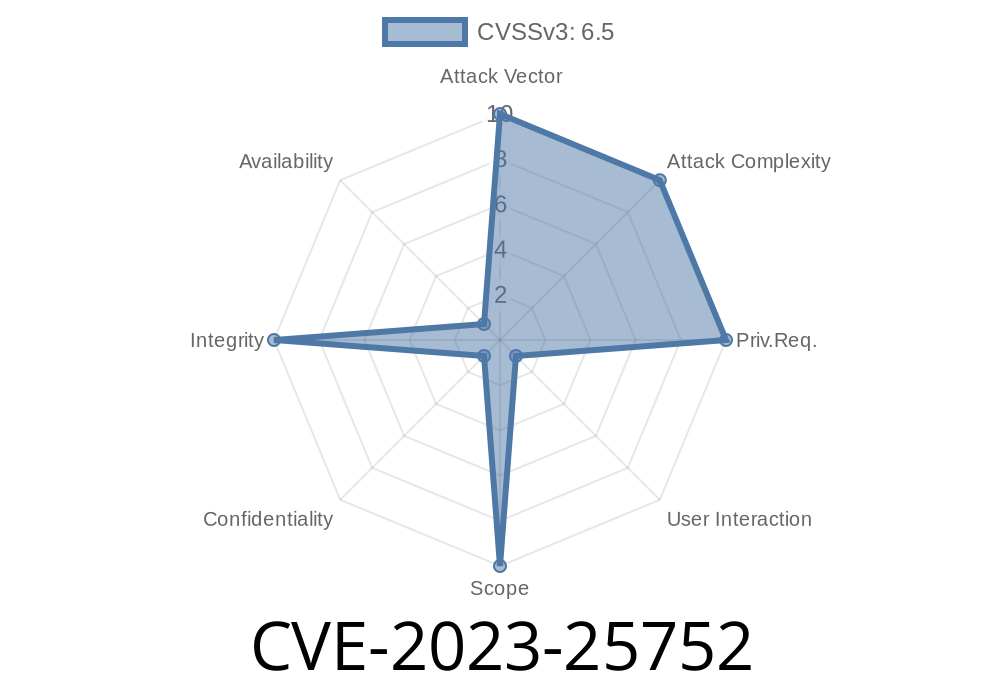In early 2023, a new vulnerability was discovered in Mozilla’s popular web browser, Firefox, and its email client Thunderbird. This flaw, tracked as CVE-2023-25752, related to how these programs handled throttled streams—which are mechanisms used to manage the flow of data in and out of the software. Below, I'll break down the vulnerability in simple terms and provide example code, references, and details of how it might be exploited. This write-up aims to make CVE-2023-25752 easy to grasp, even for non-experts.
What is CVE-2023-25752?
In short, CVE-2023-25752 arises from a failure to properly check the number of available bytes when reading from a throttled stream. This faulty check occurred in Firefox (< 111), Firefox ESR (< 102.9), and Thunderbird (< 102.9). When code accesses data from a stream with a limit on how much data can be consumed at once (a "throttled" stream), it needs to make sure that it doesn't read more than is available. If a program doesn't make this check, it can end up reading out-of-bounds memory, leading to incorrect behavior or, in bad cases, a security hole.
Cause: The Dangerous Missed Check
When dealing with streams in programming, especially those that are throttled, it's crucial to ensure that a function doesn't try to read more bytes than what is available. In the vulnerable versions of Firefox and Thunderbird, this count was not consistently checked in the calling function—the piece of code asking for data. As a result, future code could become incorrect, possibly making it easier for attackers to read or manipulate data that they shouldn't be able to.
Here’s a simplified snippet showing the logic that *should* happen versus what *actually* happened:
Safe Code (What Should Have Happened)
// hypothetical, simplified example
size_t available = stream->Available(); // Check how much data we can read
size_t bytesToRead = std::min(requestedBytes, available);
stream->Read(buffer, bytesToRead);
Unsafe Code (What Actually Happened)
// function forgot to check available bytes
stream->Read(buffer, requestedBytes); // What if requestedBytes > available?
This lack of checking allows the software to exceed the available boundary, returning incorrect data, causing memory issues, or potentially allowing more severe exploits.
How Could This Be Exploited?
By manipulating the values given to these functions—for example, by providing a crafted input or specially designed website—an attacker could trick Firefox or Thunderbird into reading beyond what was supposed to be allowed. This could lead to:
Triggering a crash (denial of service) by accessing unavailable memory.
- In rare cases, further code execution—though there’s no public advanced exploit for this as of yet.
Real-World Scenario
Imagine a web page using a JavaScript API to load a resource, but under the hood, the browser doesn't check how much data it can safely read. The page could request way more data than exists, exposing memory it shouldn’t have access to. In email clients like Thunderbird, a crafted email attachment could potentially exploit the same vulnerability.
Patch and Recommendations
Mozilla quickly fixed this issue in Firefox 111, Firefox ESR 102.9, and Thunderbird 102.9 by ensuring that all functions calling into throttled streams properly check the count of available bytes. From now on, code properly limits read operations, as shown in the "Safe Code" snippet above.
What You Should Do
- Update your software. If you use Firefox, Thunderbird, or Firefox ESR, make sure you’re running at least the fixed versions.
Follow official advisories:
- Mozilla Foundation Security Advisory 2023-07
- NIST NVD Entry
References & Further Reading
- Mozilla Security Advisory for CVE-2023-25752
- CVE Details: CVE-2023-25752
- NIST National Vulnerability Database
Conclusion
While this bug might seem technical, it points out the importance of being careful when handling data in any program. Off-by-one errors and unchecked boundaries can open the door to attackers. Mozilla responded quickly, but users should always stay up to date to stay safe.
Timeline
Published on: 06/02/2023 17:15:00 UTC
Last modified on: 06/09/2023 18:40:00 UTC
